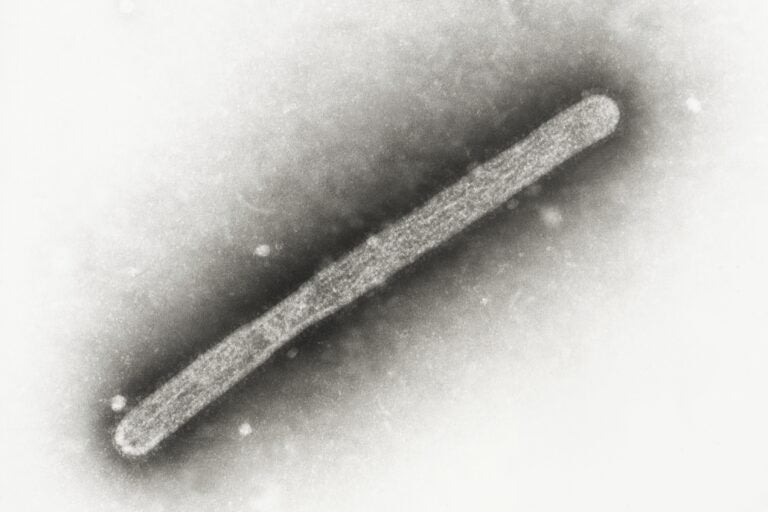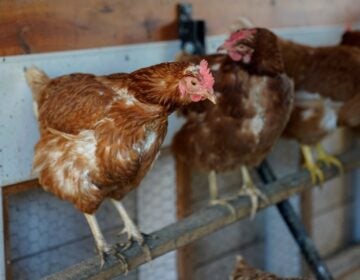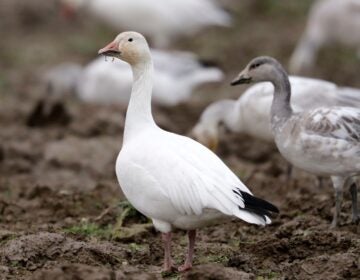What should New Jerseyans know about bird flu?
The state’s new avian influenza website is keeping tabs on the spread of bird flu. The risk is low for humans, but it’s dangerous for poultry flocks.
Listen 1:03
FILE - This 2005 electron microscope image shows an avian influenza A H5N1 virion. The Centers for Disease Control and Prevention on Tuesday, July 30, 2024, announced it will spend $5 million to buy seasonal flu shots for livestock workers. (Cynthia Goldsmith, Jackie Katz/CDC via AP, File)
From Camden and Cherry Hill to Trenton and the Jersey Shore, what about life in New Jersey do you want WHYY News to cover? Let us know.
The New Jersey Departments of Agriculture, Health and Environmental Protection launched an Avian Influenza website earlier this month that displays up-to-date information on prevention and response to the H5N1 virus.
“As we prepare for the fall migration of wildlife from north to south, we wanted to have a landing page for people to find relevant information related to how it’s moving through the area,” said Ed Wengryn, Secretary of the New Jersey Department of Agriculture.
There has not been a single case detected in New Jersey.
What is Avian Influenza or H5N1 virus?
Bird flu began to spread in North America three years ago. Wild birds worldwide are carriers of the virus. The virus created havoc among domesticated poultry and dairy cows in some states. Dairy workers have also been infected.
The Center for Disease Control says the current risk to humans is low, but it is monitoring for exposure among people. Here is the Centers for Disease Control and Prevention’s resource for Bird Flu Current Situation.
Symptoms in birds and dairy animals
Officials say bird flu infects the respiratory and gastrointestinal tracts of birds and is often fatal to avian populations. The virus can also infect dairy cows. According to the U.S. Department of Agriculture, cows infected with the virus may experience a sudden decrease in appetite and their milk production levels will drop, sometimes dramatically. They may also have respiratory issues and clear nasal discharge.
Threat to Humans?
New Jersey state epidemiologist Dr. Tina Tan said officials are carefully monitoring the situation but “the risk to humans right now, to people, the general risk is very low.”
She said humans infected with H5N1 experience typical flu-like respiratory symptoms. Some people may also develop conjunctivitis.
Who is most likely to be affected?
Wengryn said avian influenza can pose a potential threat to “people working with livestock, with poultry, turkeys, chickens, people with backyard flocks or their own flock or particularly production people that use free-range poultry are mostly at risk.”
‘It’s an alert thing’
One farm worker in Colorado was diagnosed with avian influenza in 2022 and three others tested positive for the virus in Texas and Michigan earlier this year.
Earlier this summer, health officials in Pennsylvania told medical providers, health offices and hospitals to test for influenza.
The virus has been detected in a total of 13 states in dairy animals and humans.
Wengryn said H5N1 surveillance is especially important right now because migratory birds are heading south in the coming weeks along the western, central and eastern flyways. They have all been together in the same Canadian nesting-ground, where the virus could have spread.
What can New Jerseyans do?
State officials are asking residents to contact state fish and wildlife officials immediately if they come across more than one dead bird in the wild. Pasteurization kills the virus, and officials are advising residents against consuming raw milk products until the threat disappears.

Get daily updates from WHYY News!
WHYY is your source for fact-based, in-depth journalism and information. As a nonprofit organization, we rely on financial support from readers like you. Please give today.





